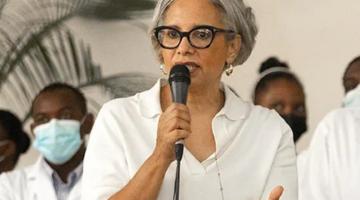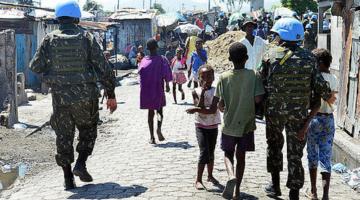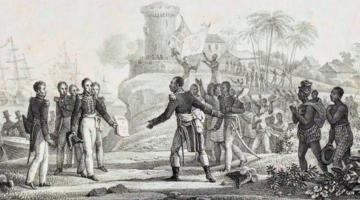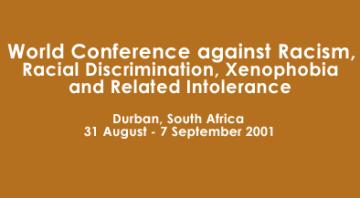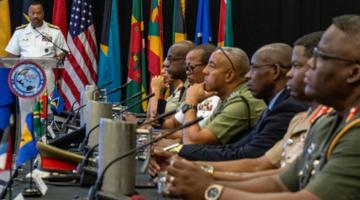“The EU states involved -- especially Britain, France and Spain -- have made it crystal clear they don‘t want to play ball on the issue.”
Fifteen Caribbean Community, Caricom, governments are being strongly advised to get ready for the long haul in their continuing quest for Reparations for Slavery and Native Genocide from Britain, France, Spain and other European Union, EU, member-states.
The governments of mainly former British and French colonies have characterized the 400 years of Slavery and Native Genocide that took the lives of 12 million Africans and 15 million indigenous people in the captured and colonized West Indies and Antilles as "The Greatest Crime Against Humanity in the History of Humankind."
Collective Demands
They are collectively demanding through National Reparations Committees, NRCs, upwards of 150 billion pounds (sterling) worth of reparations -- from Britain alone -- for the 640,000 enslaved persons in the Caribbean at Emancipation.
Led by the Caricom Reparations Commission, CRC, each nation will make its individual claim – in the case of Saint Lucia against both Britain and France, which exchanged the island between then 14 times.
The Long Haul
But is Caricom ready and willing to go the distance with a Europe still very united in its denial of responsibility for crime, far less doing the time?
The Caricom governments are hoping to engage the EU and culprit member-states to discuss and negotiate possibilities and mechanisms for compensation and repair of their historic crimes in a region they raped and plundered for centuries before turning their backs on the victim peoples and countries.
The EU states involved -- especially Britain, France and Spain -- have made it crystal clear they don‘t want to play ball on the issue.
The Caricom leaders have not publicly disclosed the current state of play in light of the refusal of the Europeans to even listen.
But what are the Caribbean governments really asking for?
Ten Demands
Back in 2013 when the Caricom leaders formally agreed to pursue reparations in each member-state, they also published a "10 point Action Plan" called "The Caribbean Reparatory justice Program."
These 10 demands have been described as everything from “reasonable” to “very unreasonable.”
The Caribbean governments want:
1. A full and formal, explicit statement of apology
2. A Repatriation program to facilitate African descendants who want to return to and reintegrate in the continent from which over 10 million of their ancestors were stolen from their homes and forcibly transported to the Caribbean as enslaved chattel property
3. A Development Plan for Indigenous People, who numbered 3,000,000 in 1700 and were reduced to 30,000 only three centuries later in 2000 and who remain landless and poor, the most marginalized people in the region
4. Establishment of cultural institutions, such as museums and libraries, to memorialize the Europeans’ crimes against humanity in this part of the world
5. Europe accepting responsibility for and assisting in addressing the impacts of the region having the highest incidence of chronic diseases Hypertension and Diabetes Type Two in the world, which pandemics have been directly connected to the nutritional experience, physical and emotional brutality and overall stress profiles associated with slavery, genocide and apartheid.
“These 10 demands have been described as everything from “reasonable” to “very unreasonable.”
6. Assistance in eradicating the remaining vestiges of illiteracy in the region, where 70 percent of the population was functionally illiterate when independence started to emerge in the 1960s and which continues to be a drag on social and economic advancement in the Caribbean
7. An action program to build "Bridges of belonging" (such as school exchanges and culture tours, community artistic and performance programs, entrepreneurial and religious engagements, etc.) to reassert a sense of identity an existential belonging and to build knowledge networks necessary for community rehabilitation
8. A program for the psychological rehabilitation of Caribbean people who have been for centuries denied recognition as equal human beings by laws derived from European palaces and parliaments
9. A technology transfer program to upgrade the Caribbean to modern scientific and technological standards following four centuries of a British edit that “not a nail must be produced” in the islands, to preserve their place as primary producers and exporters of raw materials
10. Support for payment of domestic debt and cancellation of international debt
Trends of Thought
Critics say it is both unwise and unrealistic to expect the culprit countries to apologize, admit guilt and thus qualify themselves to have to have to pay reparations.
But there are also those who argue that the electoral process always, from time to time, throw-up leaders and governments that break with the trend and bow to truth.
Another trend holds that the sloth of the process has robbed the Caribbean governments of opportunities to beat-back or buttonhole some of the British arguments under both the David Cameron and current Theresa May administrations.
Benefits of Hindsight
It was known – though not publicly – that Prime Minister Cameron’s direct ancestors had been paid handsome sums in reparation for hundreds of slaves owned in Jamaica. With the benefit of hindsight, some now argue that the Caribbean leaders should have taken that into consideration when issuing their invitation to the Cameron administration for talks.
Some London-based reparations advocates also now recall recommending that immediately following their decision to pursue reparation, the Caricom leaders could and should have noted that then British Foreign Secretary in the Cameron administration, William Hague (2010-14) had seven years earlier authored a book on a related subject.
Hague wrote and published "William Wilberforce -- The Life of the Great Anti-Slave Trade Campaigner" (2007) and as Foreign Secretary he could have been approached by the Caricom leaders to help his fellow Cabinet ministers understand why the reparations demands will not go away.
Another Opportunity?
Another opportunity has (so far) also been missed, but is not yet out of the window.
As Home Affairs Secretary under Cameron (before he was "Brexited" from office), Mrs May led an official campaign against ‘Modern Slavery’ in Britain. Within days of becoming Prime Minister, she announced dedication of 30 million pounds (sterling) to fight and end ‘Modern Slavery’ in the UK.
The feeling is that before PM May herself also gets "Brexited" from office herself, the Caricom leaders should remind her that the reason the current trafficking in human bodies is described as "Modern" slavery is because it was long ago preceded by an original economic system built, bred and led by the British, which fed the growth of Britain with the profits from the blood, sweat and tears of millions of African slaves.
What’s Left to Do?
But should all this fail, what’s left for the Caribbean leaders to do?
Actually, they do still have options.
They can more directly demand discussions with the EU and culprit nations, within an established time frame, failing which the Caribbean leaders can move to another phase engaging the international community and international public opinion.
The Caribbean governments can also take the culprit countries to the World Court, the International Court of Justice and all other related international legal and judicial entities capable of looking into and pronouncing on a collective complaint by over a dozen countries.
Many Precedents
The reparations demand has many modern precedents: The Jews were settled by the Germans for the inhuman Nazi Holocaust; the Japanese Americans forcibly interned by the US during World War II on suspicion of being spies were also compensated; and The Mau-Mau tribal complaint against the British for atrocities committed during the Kenyan independence struggle was more recently settled "out of court."
But none of the foregoing atrocities even approaches the barbarity of the Caribbean’s Slavery and Native Genocide experience, in which tens of millions of Africans and their descendants were uprooted and transplanted across the world and subjected to the longest and most criminal form of exploitation and extermination of man by man in the history of humankind.
The Last Dice
The Caribbean leaders seem to be holding the legal option as a last resort, an ultimate one -- their last dice to roll.
Each of the plaintiff countries is preparing its own legal case for contribution to whatever joint legal representation may be made at the international level.
The CRC and NRCs, working with and through Caricom Prime Ministerial Subcommittee on Reparations (Chaired by Barbados Prime Minister Freundel Stuart) is certain that the region has a winnable case.
But the apparent sloth of the Caribbean’s regional political directorate on the issue is causing concern in some sections of the regional movement.
There are also suspicions that some of the governments may have already started drawing-down on the 350 million pounds British PM David Cameron deposited in 2015 as what he only stopped short of describing during his Jamaica visit as Britain’s one-off reparations payment to the region.
Concerns
Caricom leaders are accused by some of being less vocal at the annual UN General Assembly sessions on the Reparations issue than they were in 2015 -- some even loudly wondering whether that has any connection with Cameron’s "deposit."
But all in all, the region’s leaders remain committed in principle to the Reparations cause, insiders noting that the regional movement got considerable moral support from the current Caricom Chairman, Guyana’s President David Granger -- himself also a long-standing private academic, writer and publisher with deep interest in African history and studies.
Will the British Blink?
So, will the British blink, or will the Caribbean have to switch gear? Will the EU continue to bury its head in the Caribbean sands or will Brussels warn its culprit member-states that they cannot deny their roles in commission of The Greatest Crime Against Humanity known to humankind?
And will the Caricom leaders move fast enough to quickly and directly engage Britain and France, through Prime Minister Theresa May and President Emmanuel Macron, with appropriate language to impress on them – and the EU – just how serious the Caribbean is about pursuing Reparations for Slavery and Native Genocide?
It All Depends
It all depends on the pace of developments at the global, regional and national levels.
But the momentum at some crucial levels has been widely noted as having decreased and the general hope is that the recent historic events in Jamaica -- especially the launching of the Center for Reparations Research -- will accelerate the pace of progress at all levels.
As the old blacksmith saying goes, the regional reparations movement is being encouraged to "Beat the iron while it’s hot!"
Earl Bousquet is a Saint Lucia-based veteran Caribbean journalist.
This article previously appeared in TeleSUR and Portside.

